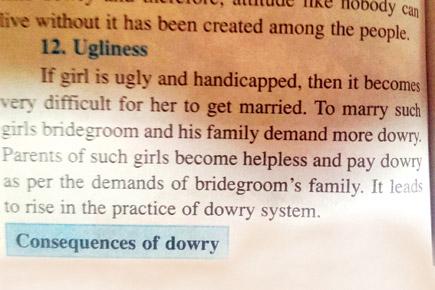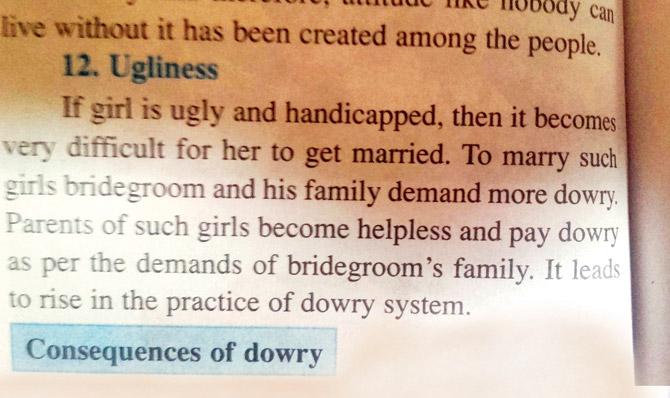The current outrage (as an aside, surely it is time to assign 'outrage' the status of an event, like lathi-charge or walk-out) over Maharashtra Class XII sociology text books raises some politically thorny questions about political correctness

An extract from a section on dowry in the sociology textbook prescribed by the Maharashtra State Board of Secondary and Higher Education for class XII. Pic/Dilip D'Souza/ Twitter

An extract from a section on dowry in the sociology textbook prescribed by the Maharashtra State Board of Secondary and Higher Education for class XII. Pic/Dilip D'Souza/ Twitter
 The current outrage (as an aside, surely it is time to assign 'outrage' the status of an event, like lathi-charge or walk-out) over Maharashtra Class XII sociology text books raises some politically thorny questions about political correctness.
The current outrage (as an aside, surely it is time to assign 'outrage' the status of an event, like lathi-charge or walk-out) over Maharashtra Class XII sociology text books raises some politically thorny questions about political correctness.
ADVERTISEMENT
In a section on social evils, the text books noted that dowry was higher if the prospective bride was ugly or handicapped. The discrimination and disrespect of these terms has been debated for long enough that it has percolated into everyday thinking — and school teachers' discomfort with using these words was evidence of that.
One of the reasons for this discomfort was that they would have to use such terms in class, and that would hurt students to whom the words 'ugly' or 'handicapped' might pertain. Not wanting to hurt people is undeniably a good thing, but it does not actually question the terms in anyway.
The disability rights community has worked hard to replace the term 'handicapped' with 'disabled'. Using the term is not just a matter of political correctness as it represents an entire mindset. For instance, the community has also rejected the sarkari term 'divyang' because it patronises disability as a mystical blessing rather than dealing in a matter-of-fact way with its structural needs. It is similar to the mindset which says, “I don't want to hurt you.” It implies that you are unable to bear the ugly truth of your situation and of course must be protected from it — but the situation is not the problem, you are.
Which brings us to 'ugly', a word that suggests something that on being looked at causes revulsion and rejection. The debate on this as a term of prejudice not description is an old one. One of the text book writers responded: the books were not instructing students to think people are ugly, but rather, listing it under social evils.
Matrimonial advertisements and dowry hierarchies are a visible form of appearance discrimination. However, we also know that many people sharing this news item on social media are probably discriminating invisibly against people on the basis of appearance, whether looks or fashion, professionally through hiring tendencies or socially through simple meanness. And that many ideas of beauty are rooted in caste and class as well.
Queried on this, most of these people will argue that beauty is an actual thing, isn't it? I would agree with them. Others would say, that everyone is beautiful in their own way. I would agree with moderation. Everyone has their charms, but beauty is an actual thing, classically speaking. Political correctness need not turn into a scolding campaign that denigrates beauty.
Personally, many things may turn me off — but physical appearance has almost never been the reason. Someone's nature often has been. Other people don't mind how mean someone is as long as they look like a Miss World type. And, once in a while, there are some people so beautiful we can't stop looking at them, but that doesn't make those, who don't look like that, ugly.
To be able to deal with this variance of response, reality as not ugly or lovely, but complicated, is the purpose of education. That's what equips us for enriching debate instead of shrill oppositionality. Our text books need to be designed with that in mind, not absolute truths for indoctrination, good or bad.
Paromita Vohra is an award-winning Mumbai-based filmmaker, writer and curator working with fiction and non-fiction. Reach her at www.parodevipictures.com
 Subscribe today by clicking the link and stay updated with the latest news!" Click here!
Subscribe today by clicking the link and stay updated with the latest news!" Click here!







